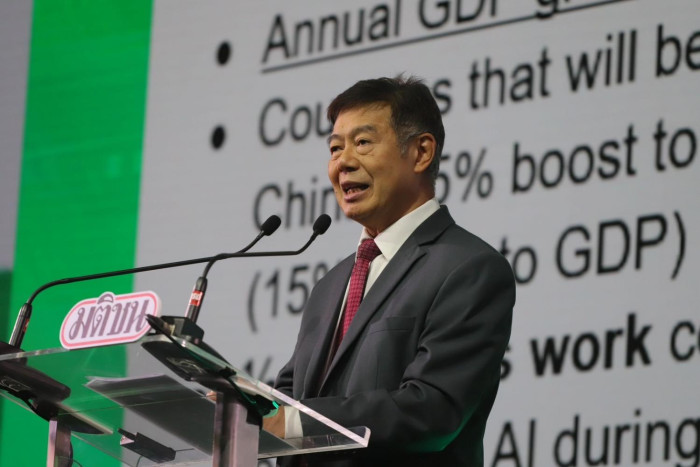Key Takeaways
- Thailand urged to focus on impactful AI applications, not just data centre investment
- AI could add $7-15 trillion to global GDP by 2030 but may widen economic gaps
- By 2030, 70% of work expected to be affected by AI with full autonomy approaching
- Thailand leads Southeast Asia in AI adoption but faces integration challenges
Thailand must prioritize widespread artificial intelligence (AI) implementation for real economic impact rather than concentrating only on attracting AI data centre investments, according to leading economists and technology experts. This strategic shift is crucial for maintaining global competitiveness as AI advances toward full autonomy by 2030.
Economic Imperative for AI Adoption
Supavud Saicheua, chairman of the National Economic and Social Development Council, emphasized that Thailand needs to broaden its AI embrace beyond hyperscale data centres. “Thailand needs to broaden its embrace of AI and technology, rather than focusing on attracting and investing in hyperscale data centres,” he stated at an AI for Equality seminar.
The country plans significant data centre expansion, increasing capacity from 350MW to 1,000MW within three years with a $6.5 billion investment. National Telecom alone plans a $1.5 billion, 150MW hyperscale facility. However, Mr Supavud highlighted efficiency concerns, noting a one-gigawatt data centre can consume resources equivalent to 200,000-300,000 households while employing only about 50 workers.
Global AI Impact and Economic Disparities
Studies indicate AI could contribute $7-15 trillion to global GDP by 2030, boosting annual growth by 0.7-1.2 percentage points. Approximately 50% of current work could be automated between 2030-2060. More critically, emerging economies like Thailand face a complementarity gap – while they have high AI exposure, they receive lower economic returns compared to advanced economies.
Only 27% of jobs in emerging markets are AI-exposed, with just 9% experiencing high complementary benefits. “This reflects the fact that AI will widen the gap between developed and emerging countries,” Mr Supavud warned. Service, sales and clerical jobs face highest displacement risk, while managers and professionals stand to benefit.
The Trust Economy and Workforce Transformation
Ruangroj Poonpol, group chairman of Kasikorn Business-Technology Group, described AI’s shift from knowledge economy to trust economy, where success depends on public trust in AI systems. We’re currently in AI’s third wave with agentic AI integration, heading toward full autonomy by 2030.
By 2030, 70% of work will be AI-affected, demanding new skills:
- Hard skills: AI and big data, cybersecurity, technology literacy
- Soft skills: Creative thinking, resilience, flexibility, agility
Mr Ruangroj cautioned about AI over-reliance: “Organisations must focus on both retraining their workforce and evaluating whether AI-driven teams are becoming ‘too lazy to think’.” By 2027, 75% of hiring will include AI proficiency testing.
Thailand’s AI Landscape and Challenges
Despite being Southeast Asia’s AI adoption leader in finance, telecom, e-commerce and manufacturing, Thailand faces significant hurdles. Boston Consulting Group identifies Thailand as the regional frontrunner, yet a 2025 survey showed only one-third of organizations achieved expected AI benefits.
Key challenges include:
- Legacy system integration – the biggest bottleneck
- Governance and ethics concerns
- Workforce development gaps
- Measuring and scaling outcomes
Mr Ruangroj identified 2026 as “the year of AI realism,” noting large Thai organizations have uneven AI maturity. Organizations leveraging multi-agent AI for 80% of customer processes by 2028 will lead markets.
Bridging the Equality Gap
Both experts emphasized AI’s potential to level the playing field. Kantima Lerlertyuttitham, AIS deputy CEO, described initiatives like AIS Academy that transform employee training into public learning platforms. “The goal is to use tech to break down barriers in education and skill development, helping everyone grow together,” she said.
For Thailand, strategic AI implementation could address labour scarcity from low birth rates, ageing demographics, sovereign debt, and climate change while promoting greater economic equality.




